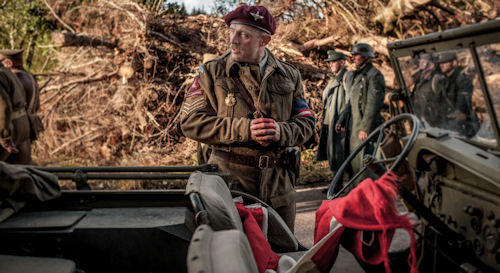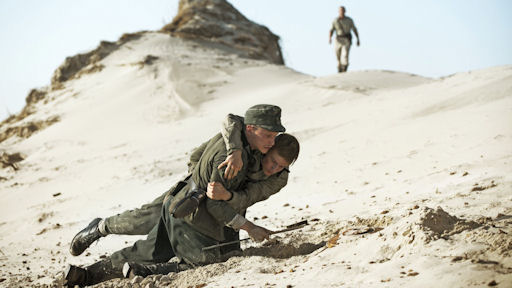
In post-World War II Denmark, a group of young German POWs is forced to clear a beach of thousands of land mines under the watch of a Danish sergeant who slowly learns to appreciate their plight.
Roland Møller plays Sgt. Carl Rasmussen, a battle-hardened soldier who has seen the worst war can dish out. Rasmussen has faced brainwashed Nazi troopers who committed the worst atrocities in history. Now, he is part of the post-war payback. He commands a group of German prisoners of war who have been chosen for the most hazardous task imaginable. If they complete their task he promises them their freedom. If they live, that is. If they refuse the work, they will be penned up to starve to death in weeks or days.
The prisoners are the last survivors of the desperate final gasp of Nazi defense. As such, they are the youngest males in Germany able to march and shoot a rifle. Most are teenagers. The oldest few might be in their early twenties. They joined the military because they were terrified of the SS, which would hang classmates who refused, or were too paralyzed with fear, to join the military. Now they are terrified of being prisoners, homesick beyond comprehension and in a fog of disbelief about the task that awaits them.
The task is clearing land mines from the beaches of Denmark. With a gray sky perpetually looming overhead, the starving, despairing boys will locate the mines one by one by crawling across the cold, muddy sand. Then they will carefully clear the sand away from the trigger mechanisms and unscrew the detonator assemblies. The detonators go in one pile and the mines go in another. As the work proceeds, about half of the prisoners die in mine explosions. The cinematography concentrates on the dead mud, the dead sky, the slate flat sea and the barely moving boys inching to their deaths, or to their next, perhaps last, detonator.
Like the best war films, writer/director Martin Zandvliet’s work develops the humanity that emerges even in the worst of times. Even while sending the sick, semi-conscious boys to their death, Rasmussen cannot help but grow close to them. Despite the most virulent rules to the contrary, he steals minute morsels of food for them. As the story proceeds he sees, and we see at the same time, that the real enemy is not other people, but war itself.
The deathly gray of the indistinguishable land and sea breaks to show rays of light. The boys and the sergeant grapple with their feelings while trying to sort out the meaning of victor and vanquished, of young and old, and of German and Dane. In the background, the seething, traumatized walking dead of war grapple with their vengeance, turning their backs on the murderous fate of the youth. Like many, they can distance themselves from the death sentence they have imposed. But we are not able to look away.

Rating: 9/10
. . .
Join us on Facebook at
http://www.facebook.com/itsjustmovies!